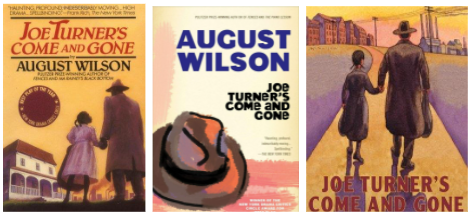By: Juju Nieto
Synopsis & Themes
Joe Turner’s Come and Gone is a play that takes place in 1911 and highlights the people who come in and out of a Pittsburgh, Black owned, boarding house. The play explores the relationships between the tenants and the owners, and focuses on the way these relationships shift upon the arrival of Harold Loomis and his daughter Zonia. After having been illegally enslaved for the past five years, Loomis is in search of Martha, his wife, purpose, and a new identity free from his past of enslavement.
Wilson uses his play to explore the themes of loss, spirituality, and identity. Wilson also explores the relations between formerly enslaved, Southern, Black Americans, and free Northern Americans in the midst of reconstruction, the great migration, and the beginning of America’s Jim Crow Era.
Joe Turner’s Come and Gone was first performed in 1984, and published in 1986.
Awards
Joe Turner’s Come and Gone won the New York Drama Critics Circle Award for Best Play in 1988, and was nominated for several Tony Awards upon its Broadway premiere in 1988 and revival in 2009. The play also won the Theatre World Award. Joe Turner’s is still produced and performed today in regional theaters, community theaters, and schools.
Challenges
August Wilson’s work is no stranger to challenges, especially in schools. The most notable challenge for Joe Turner’s Come and Gone specifically occurred in 2011 in Waterbury, Connecticut. The local arts high school, Waterbury Arts Magnet High School, was in rehearsal for Joe Turner’s when the play was cancelled due to the use of the “n-word” throughout the play. This specific production was challenged by David Snead, superintendent of the Waterbury School district. Snead, who is a Black man, stated that “The use of the N-word is something all civil rights leaders around the country want us to stop using,” and that educators should actively avoid any content that might encourage students to use the word. The principal of the school and the teacher who is spearheading this production argue, however, that all of the proper channels for approving this play were followed. Additionally, when the Principal of the school looked into ways to change the word in the scripts, the school was met with disapproval from the rights-holder of the play.
Nina Smith, the teacher in question, continued that she has gone out of her way to do her due diligence in educating and protecting the students within the school and production. She used and distributed educational materials on the “n-word” to students in the school, coordinated talkbacks, opened rehearsals to parents, and read the entire play to the mostly Black cast and their parents before moving forward with rehearsal. The show was allowed to continue with the framing of pre and post show discussions of the content and with an educational endorsement from the Yale Repertory Theatre.

About the Author
August Wilson was born Frederick August Kittel in Pittsburgh, Pennsylvania in 1945. Upon dropping out of high school at 15, Wilson turned to the Pittsburgh Public libraries for his education and began writing on a typewriter bought at a secondhand store. In the 60’s Wilson was a part of the Black Arts Movement, co-founded the Black Horizons Theater in Pittsburgh and published poetry through the 70s. Wilson wrote his first play, Jitney, in 1979 with minor success. His second play, however, entitled Ma Rainey’s Black Bottom, eventually went to Broadway and won many awards.
August Wilson himself has won several awards and is considered one of the most prolific Black playwrights in America. Wilson has won two Pulitzer prizes for drama, two Tony Awards, seven New York Drama Critics’ Circle Awards, has received the Guggenheim and Rockefeller fellowships, and has a Broadway theatre named after him. There have also been three movies made out of Wilson’s play.
Additional resources
August Wilson’s The Ground on Which I Stand: A manifesto in defiance of White American Theatre
NYT Article on Waterbury, Connecticut’s Challenging of Joe Turner’s
National Coalition Against Censorship article on continuation of Wilson Play